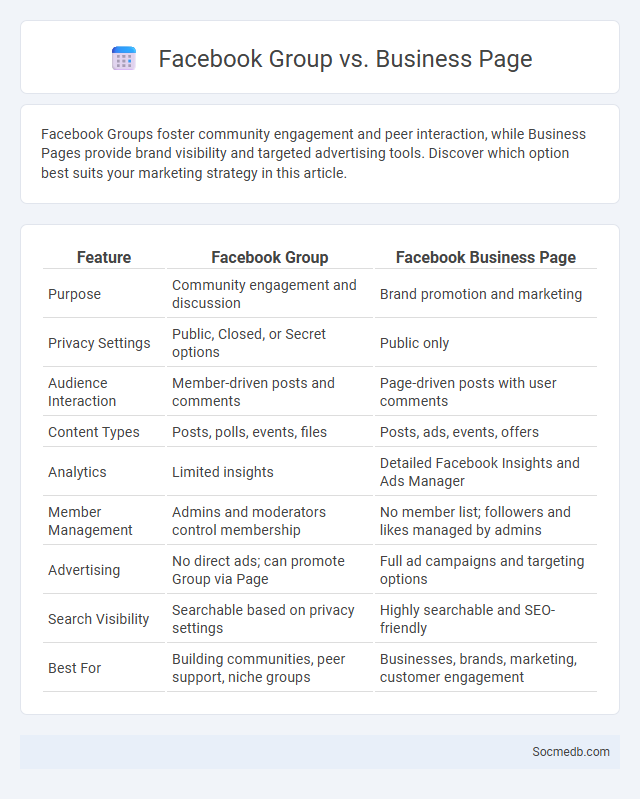
Photo illustration: Facebook Group vs Business Page
Facebook Groups foster community engagement and peer interaction, while Business Pages provide brand visibility and targeted advertising tools. Discover which option best suits your marketing strategy in this article.
Table of Comparison
| Feature | Facebook Group | Facebook Business Page |
|---|---|---|
| Purpose | Community engagement and discussion | Brand promotion and marketing |
| Privacy Settings | Public, Closed, or Secret options | Public only |
| Audience Interaction | Member-driven posts and comments | Page-driven posts with user comments |
| Content Types | Posts, polls, events, files | Posts, ads, events, offers |
| Analytics | Limited insights | Detailed Facebook Insights and Ads Manager |
| Member Management | Admins and moderators control membership | No member list; followers and likes managed by admins |
| Advertising | No direct ads; can promote Group via Page | Full ad campaigns and targeting options |
| Search Visibility | Searchable based on privacy settings | Highly searchable and SEO-friendly |
| Best For | Building communities, peer support, niche groups | Businesses, brands, marketing, customer engagement |
Introduction: Understanding Facebook Groups and Business Pages
Facebook Groups foster communities where members engage around shared interests, enabling organic conversations and stronger connections. Business Pages serve as official brand profiles designed to promote products, share updates, and advertise directly to your target audience. Understanding the distinct roles of these tools allows you to strategically leverage Facebook's platform for enhanced customer interaction and brand growth.
Key Differences Between Facebook Groups and Business Pages
Facebook Groups foster community interaction with member-driven content and discussions, ideal for building niche audiences and engagement. Business Pages serve as official brand profiles designed for marketing, allowing targeted advertising, insights analytics, and public posts. Groups emphasize closed or private settings enhancing exclusivity, while Pages ensure wide visibility and professional customer outreach.
Purpose and Ideal Use Cases for Each Option
Social media platforms serve distinct purposes tailored to different communication and marketing goals. Facebook excels in community building and targeted advertising, Instagram is ideal for visual storytelling and influencer marketing, Twitter focuses on real-time updates and customer engagement, LinkedIn targets professional networking and B2B marketing, while TikTok thrives on short-form, viral video content perfect for reaching younger audiences. Understanding each platform's strengths helps you maximize your brand's visibility and engagement by choosing the right social media channel for your specific objectives.
Audience Engagement: Group vs Page
Groups on social media foster higher audience engagement by facilitating conversations and creating a sense of community among members. Pages primarily serve as a broadcast platform for your brand or business, offering less interactive opportunities compared to Groups. Choosing Groups over Pages can significantly boost your interaction rates and build stronger relationships with Your audience.
Content Visibility and Reach Comparison
Social media platforms vary significantly in content visibility and reach, with algorithms prioritizing different types of engagement and user interactions. Understanding how each platform's algorithm works can help you optimize your content strategy to maximize audience exposure, such as leveraging Instagram's Stories for immediate engagement or LinkedIn's professional network for targeted reach. Tailoring your posts' format and timing according to platform-specific trends enhances content visibility and broadens your overall social media reach.
Administrative Features and Control
Administrative features in social media platforms empower community managers to moderate content effectively by implementing user roles, content approval processes, and automated moderation tools. Control mechanisms include customizable privacy settings, detailed activity logs, and user access restrictions to ensure compliance with organizational policies and regulatory standards. These tools collectively enhance security, maintain platform integrity, and streamline the management of user-generated content.
Marketing and Promotion Capabilities
Social media platforms offer advanced marketing and promotion capabilities, including targeted advertising tools that leverage user demographics, interests, and behaviors to maximize campaign effectiveness. Features like influencer partnerships, real-time analytics, and interactive content formats enhance brand visibility and consumer engagement, driving higher conversion rates. Businesses utilize social media algorithms to optimize content distribution, ensuring promotional messages reach the most relevant audiences for improved ROI.
Analytics and Insights: What You Can Measure
Social media analytics enables the measurement of engagement metrics such as likes, shares, comments, and follower growth to evaluate content performance. Insights include audience demographics, sentiment analysis, and peak activity times, helping to tailor strategies for maximum impact. Monitoring click-through rates, conversion rates, and reach provides a comprehensive understanding of campaign effectiveness and return on investment.
Monetization Opportunities on Groups and Pages
Monetization opportunities on social media groups and pages include sponsored posts, affiliate marketing, and exclusive content subscriptions, enabling group admins and page owners to generate income from engaged communities. You can leverage your group's active membership or page followers by partnering with brands for targeted promotions or by offering premium access to valuable content and services. Effective monetization strategies boost revenue streams while maintaining community trust and engagement.
Choosing the Right Facebook Feature for Your Goals
Selecting the right Facebook feature depends on your specific marketing objectives, such as engagement, lead generation, or brand awareness. Tools like Facebook Ads Manager offer targeted advertising with precise audience segmentation, while Facebook Groups foster community building and direct interaction. Using Facebook Live enhances real-time engagement, making it ideal for product launches or Q&A sessions.
 socmedb.com
socmedb.com